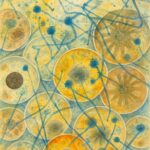Link to Pubmed [PMID] – 24192057
J Innate Immun 2014;6(2):152-8
We have recently shown that BCG (Bacillus Calmette-Guérin) vaccination in healthy volunteers induces epigenetic reprogramming of monocytes, leading to increased cytokine production in response to nonrelated pathogens for up to 3 months after vaccination. This phenomenon was named ‘trained immunity’. In the present study we assessed whether BCG was able to induce long-lasting effects on both trained immunity and heterologous T helper 1 (Th1) and Th17 immune responses 1 year after vaccination. The production of TNFα and IL-1β to mycobacteria or unrelated pathogens was higher after 2 weeks and 3 months postvaccination, but these effects were less pronounced 1 year after vaccination. However, monocytes recovered 1 year after vaccination had an increased expression of pattern recognition receptors such as CD14, Toll-like receptor 4 (TLR4) and mannose receptor, and this correlated with an increase in proinflammatory cytokine production after stimulation with the TLR4 ligand lipopolysaccharide. The heterologous production of Th1 (IFN-γ) and Th17 (IL-17 and IL-22) immune responses to nonmycobacterial stimulation remained strongly elevated even 1 year after BCG vaccination. In conclusion, BCG induces sustained changes in the immune system associated with a nonspecific response to infections both at the level of innate trained immunity and at the level of heterologous Th1/Th17 responses.
